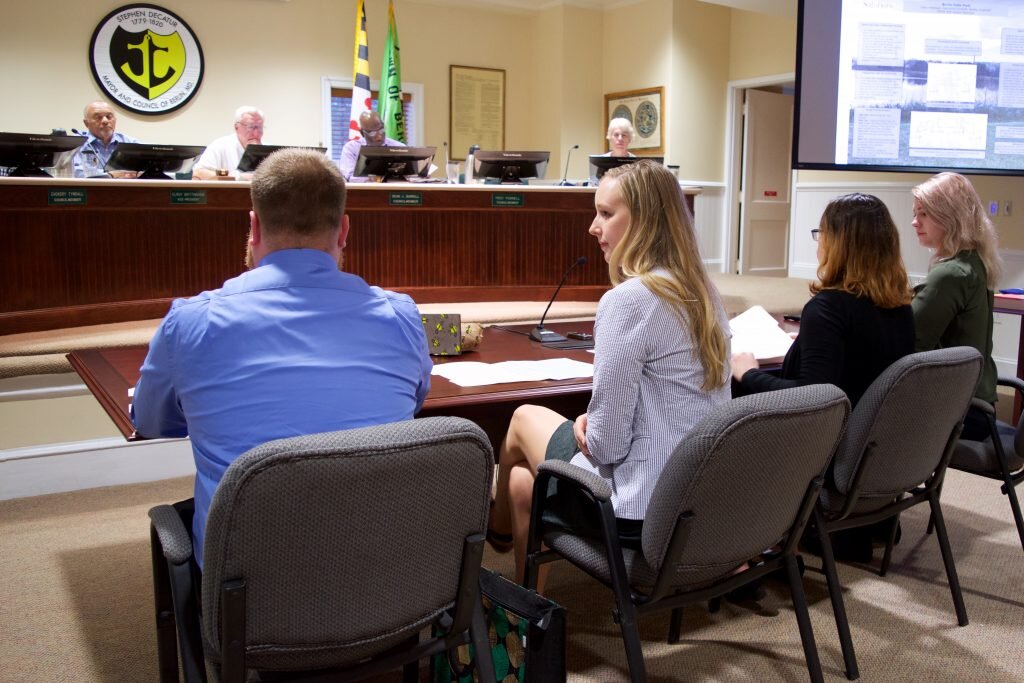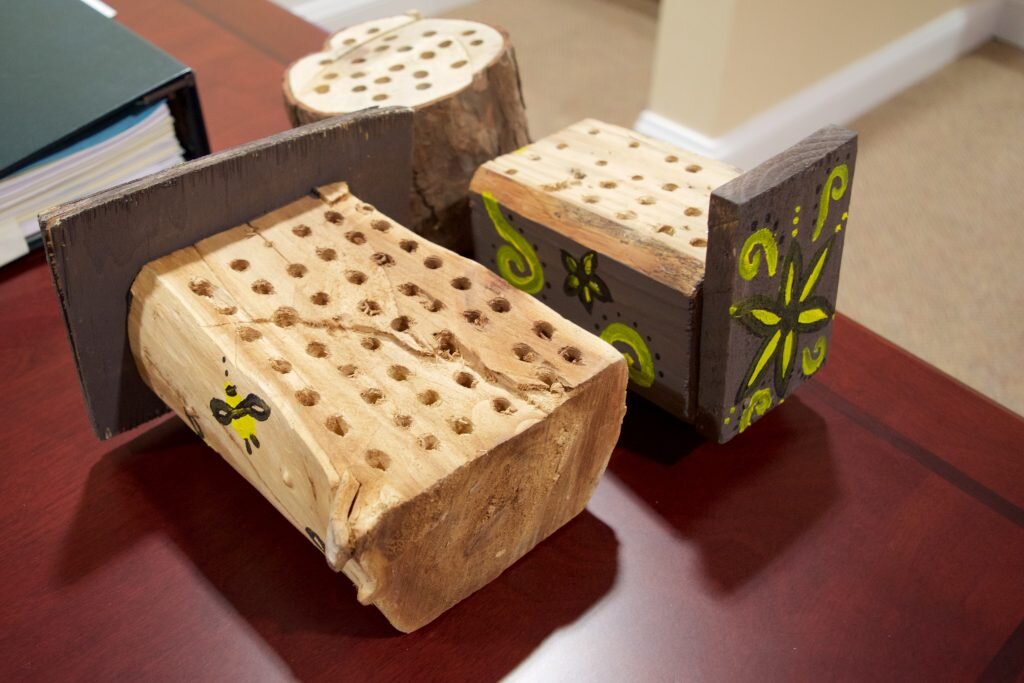
JOSH DAVIS/BAYSIDE GAZETTE
Environmental studies students from Dr. Sarah Surak’s senior seminar class at Salisbury University discuss substantiality projects with the Berlin Town Council on Monday. Pictured, from left, are Raymond Kimball, Alyssa Massey, Emma Renteria and Erin McNally.

JOSH DAVIS/BAYSIDE GAZETTE
Examples of homemade bee hotels were presented to the Berlin Mayor and Council on Monday as part of a presentation by a group of Salisbury University students.
By Josh Davis, Associate Editor
(May 17, 2018) Salisbury University students and the Town of Berlin continue to work together on a series of environmental initiatives that have, to use an analogy from Monday night’s Town Council meeting, bubbled up from individual efforts to create champagne of change.
The partnership began last spring, when environmental studies students in Dr. Sarah Surak’s senior seminar class received a tour of Berlin and heard presentations from several department heads.
Students proposed initiatives during a Town Council meeting last May, including a Green Festival, installing pollinator gardens at the town spray irrigation site, and a green business recognition program.
Four students, Erin McNally, Alyssa Massey, Emma Renteria and Raymond Kimball, returned on Monday to present an update.
McNally said three groups worked this semester to “develop and implement different sustainability focused projects in Berlin,” including certification as a pollinator-friendly Bee City, design of informational signs at Berlin Falls park, and a plastic straw-free promotion at local restaurants.
“Each group collaborated with a variety of stakeholders during this process and, by doing so, we were able to create projects we understood to fit within the values and needs of the community,” she said.
Massey and others worked on the Bee City certification, which she called “a set of commitments focusing on increasing and improving pollinator habitats in municipalities.”
She said bees were responsible for pollinating a third of our food and $10 billion worth of crops each year. Locally, Massey said, crops like strawberries, tomatoes and apples rely on pollinators.
“If adopted, the Bee City resolution will benefit Berlin … by supporting the town’s traditional tourism and also enhancing the more specific element of eco-tourism,” Massey said, adding the resolution would also promote environmental education and biodiversity.
Massey noted strategically placed pollinator gardens and bee boxes would attract solitary bees, which do not swarm or form colonies.
“Our local bees will therefore pose minimal threats to Berlin’s residents and visitors,” she said.
The council voted unanimously, 4-0, to support the motion and approve $150 for the application fee.
A group led by Kimball worked on sign concepts for Berlin Falls park. He said students visited the park and attended meetings of the Berlin Falls Park Committee, and then developed informational signs for the entrance and throughout the more than 60-acre property.
“The goal of the signage would be to educate and inform the public as they arrive to walk through the park,” he said.
Designs were presented during an April committee meeting and were well received, Kimball said.
“Though our project was not completed during our time with the town, we hope to set the groundwork for future capstone groups to come and pick up where we left off, and to further develop our plans,” he said. “The ideas and designs are being kept not only by the university, but also by the committee for further use when the time and resources are right.”
Renteria and another student met with Berlin restaurants to reduce plastic waste “by promoting a straw-free environment.”
“Our project is of significant importance … for the local environment,” she said. “Straws are one of the 10 most common types of garbage polluting the ocean. Due to this pollution, when a fish ingests plastic, they have a 50 percent chance of dying from it, affecting their species’ populations.”
She said straws also do not biodegrade, but photodegrade, “meaning they break down into more powerful pieces that last in our environment indefinitely.”
“By 2025 there is predicted to be more plastic than fish in the Ocean,” Renteria said. “Approximately 500 million disposable plastic straws are used in the United States every day. A majority of these are given out automatically to customers at restaurants.”
To help reduce waste from plastic straws, Renteria visited downtown restaurants and asked what might encourage them to switch to more sustainable practices.
“We learned that many businesses had already taken steps to decrease plastic straw use … by only handing out straws upon request or using biodegradable straws,” she said. “We assumed [disposable straws] to be a problem, but with further research discovered that businesses were more open to change than assumed.”
She said the focus was then shifted to an awareness campaign, and the group created an infographic and flyers to promote sustainable practices, and asked restaurants to take the “One Less Straw” pledge to only hand out plastic straws by request for 30 days.
McNally, in summary, said many of the initiates could continue through the work of future student groups.
“Working with the Town of Berlin made many of us realize how much we appreciate a community that is willing to work together, as well as with outside contributors,” she said. “As environmental studies students, it’s easy to get bogged by the negativity in the news concerning environmental issues and policies, but working with Berlin has been an experience that has uplifted many of us as we prepare to graduate this semester.”
Mayor Gee Williams said the students touched on something “that is starting to be rediscovered” in communities throughout the country.
“When things are forced from above, down … it doesn’t last,” he said. “It’s been our experience as a community that when it comes to efforts of this nature, sustainability is everything – it’s not just what you do now, it’s what was done after you have made your impact and what you leave behind.
“Forget trickle down – believe in bubble up,” Williams continued. “When things bubble up [through] individuals, individual restaurants, consumer habits, individual expectations – all those bubbles form together to create champagne change. That’s what you’ve done here and we’re very grateful.”
Councilman Dean Burrell thanked the students for picking Berlin.
About an hour later, during closing remarks, Burrell asked Williams to please “email or text that profound comment you made about bubbles and champagne,” drawing laughter from those remaining in the audience.
